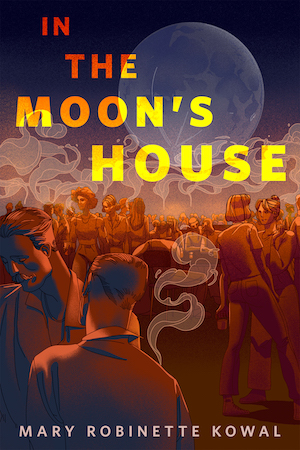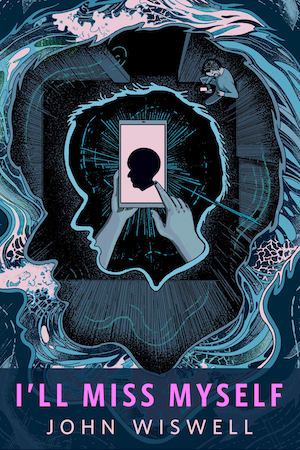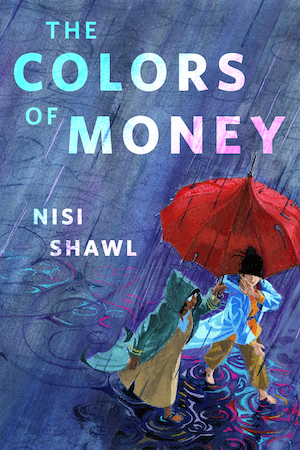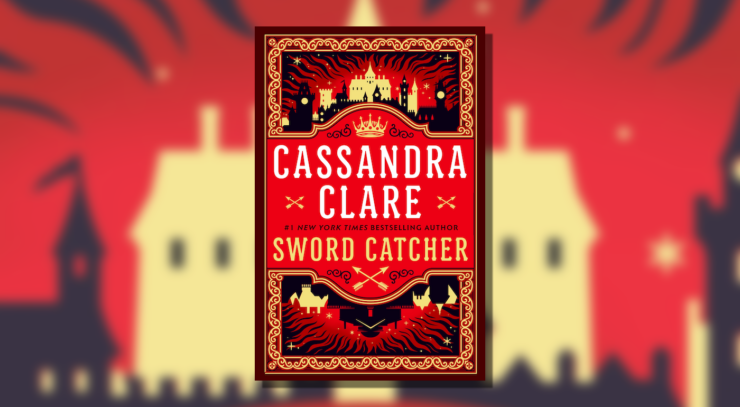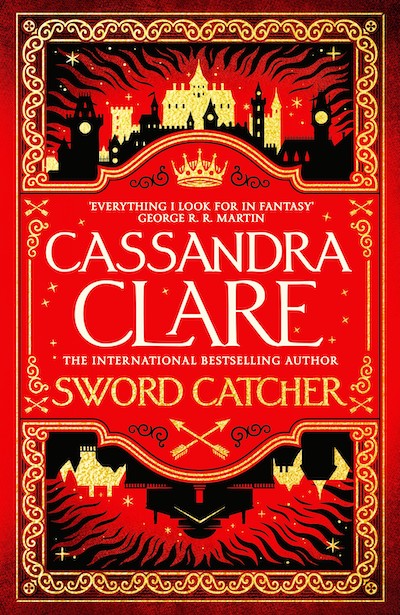Two outcasts find themselves caught in a web of forbidden love, dangerous magic, and dark secrets that could change the world forever…
Read an excerpt from Sword Catcher, the start of a new epic fantasy series from Cassandra Clare, author of The Shadowhunter Chronicles. Sword Catcher is forthcoming on October 10th, publishing in the US with Del Rey and in the UK with Tor Books.
In the vibrant city-state of Castellane, the richest of nobles and the most debauched of criminals have one thing in common: the constant search for wealth, power, and the next hedonistic thrill.
Kel is an orphan, stolen from the life he knew to become the Sword Catcher—the body double of a royal heir, Prince Conor Aurelian. He has been raised alongside the prince, trained in every aspect of combat and statecraft. He and Conor are as close as brothers, but Kel knows that his destiny is to die for Conor. No other future is possible.
Lin Caster is one of the Ashkar, a small community whose members still possess magical abilities. By law, they must live behind walls within the city, but Lin, a physician, ventures out to tend to the sick and dying of Castellane. Despite her skills, she cannot heal her best friend without access to forbidden knowledge.
After a failed assassination attempt brings Lin and Kel together, they are drawn into the web of the mysterious Ragpicker King, the criminal ruler of Castellane’s underworld. He offers them each what they want most; but as they descend into his world of intrigue and shadow, they discover a conspiracy of corruption that reaches from the darkest gutters of Castellane to the highest tower of its palaces. As long-kept secrets begin to unravel, they must ask themselves: Is knowledge worth the price of betrayal? Can forbidden love bring down a kingdom? And will their discoveries plunge their nation into war—and the world into chaos?
I’m sorry.” Not looking the least bit sorry, Dom Lafont—a nervous little man with black-rimmed spectacles perched on a warty nose—shook his head. “It isn’t possible.”
Lin Caster placed her hand flat on the wooden counter that separated them. The Lafont Bookshop in the Scholars’ Quarter was a dusty little place, the walls festooned with old prints and sketches of Castellane and famous historical figures of days past. Behind the counter, shelves of books stretched away: some bright and new, in fine colored leather jackets, some plain, bound galleys produced by the Academie to aid students in their coursework.
It was one of those—a treatise on hereditary illnesses by Ibn Sena, a teacher of medicine—that Lin itched to get her hands on. She craned her neck, trying to pick out exactly which of the bound manuscripts on the shelves it was, but the shop was too dimly lit.
Buy the Book
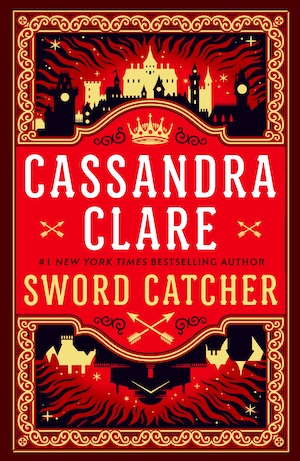

Sword Catcher
“Dom Lafont,” Lin said, “I have been a good customer of yours. A frequent customer. Is that not the case?” She turned to her friend Mariam Duhary, who was watching the interaction with worried eyes. “Mariam, tell him. There is no good reason that prevents him from selling me a book.”
“I am aware of that, Domna Caster,” Lafont protested. “But there are rules.” He wiggled his nose like a rabbit’s. “What you are asking for is coursework for the medical students at the Academie. You are not a student at the Academie. If you had a letter from the Justicia, perhaps—”
Lin wanted to slam her hand down on the counter. The man was being ridiculous. The Ashkar, as he knew perfectly well, could not attend the Academie as students, or apply to the Justicia for relief. These were Laws—bad Laws, that made her stomach twist, her blood run sour in her veins. But they had been the way of things since the founding of Castellane. “For students,” she said, making an effort to be calm, “these manuscripts are free. I am offering to pay. Name your price, Dom Lafont.”
Dom Lafont spread his hands wide. “It is not a matter of money. It is a matter of rules.”
“Lin is a physician,” Mariam said. She was a small girl, birdlike in her delicacy, but her gaze was firm and searching. “As you know. She cured your gout last fall, did she not?”
“It still comes back sometimes,” he said sourly. “Every time I eat pheasant.”
Which I told you not to do, Lin thought.
“Lin merely seeks to acquire wisdom that will allow her to heal more of the sick, and relieve their suffering,” said Mariam. “Surely you cannot object to that.”
Lafont grunted. “I know even your own people do not think you should be practicing medicine,” he said to Lin. “I know you have no business pawing through knowledge not meant for your sort.” He leaned across the counter. “I suggest you stick to what you know—your little amulets and magic trinkets. Don’t you have enough wisdom already, you Ashkar?”
In that moment, Lin could see herself in the shopkeeper’s eyes. Someone powerless, someone clearly different, almost foreign. And yes, she wore, as the laws of Castellane required, the traditional colors of the Ashkar: a gray dress, a blue jacket. And around her throat, the traditional symbol of her people: a hollow golden circle on a chain. Lin’s had been her mother’s once.
But more than that marked her out. It was in her blood, in the way she walked and talked, in something invisible that she sometimes felt hovered about her like a fine mist. She was knowably, clearly, Ashkar—alien in a way the sailors who thronged the port of Castellane simply weren’t. Travelers had a clearly delineated role and place. The Ashkar did not.
Don’t you have enough already, you Ashkar? It was what all Castellani felt to some degree. The Sundering had destroyed all magic, erased it from the world. All save the small spells and talismans of gematry, the ancestral magic of the Ashkar. Because of that, Lin’s people were hated and envied in equal measure. Because of that, special Laws applied to them. Because of that, they were not allowed out of the Sault, the walled community in which they were required to live, once the sun had gone down. As if they could not be trusted in the shadows.
Lafont shook his head, turning away. “There is a reason books like this aren’t meant for hands like yours. Come back if you’d like to buy something else. My door will be open.”
The world seemed to darken before Lin’s eyes. She took a deep breath, her small hands knotting into fists—
A moment later she found herself outside the bookstore, being steered down the street by Mariam. “Mariam, what—?”
“You were going to hit him,” Mariam said breathlessly. She had come to a stop between a lodging house for students and a shop selling ink and quills. “And then he would have called the Vigilants, and you’d have been fined, at least. You know they aren’t sympathetic to the Ashkar.”
Mariam, Lin knew, was right. And yet. “It is unbelievable,” she fumed. “That inbred bigot! He didn’t object to my knowledge when he wanted me to treat him for free, did he? And now it’s Keep your filthy hands off our books. As if knowledge belonged to any one type of person—”
“Lin!” Mariam interrupted in a whisper. “People are staring.”
Lin glanced over. Across the street was a tea shop, already crowded with students enjoying a day free of lectures. A group had gathered around a weathered wooden table outside to drink karak—a heavily spiced tea with cream—and play cards; several were looking over at her, seemingly amused. A handsome student with a mass of ginger hair, wearing a paper crown, winked in her direction.
What if I asked one of them to buy me the book? Lin thought. But no; it wouldn’t work. Malbushim tended to be suspicious of the Ashkar, and even Dom Lafont would see through such a ruse so soon after she’d made her attempt. She returned the young man’s wink with a steady glare. He put a hand over his heart as if to indicate she’d wounded him and turned back to his companions.
“We ought to get back home,” Mariam said, a little anxiously. “The streets will be a madhouse in an hour or two.”
This was true. Today Castellane’s independence was celebrated, with speeches, music, and parades stretching on into the night. Visits to temples to give thanks were conducted in the mornings; by the late afternoon, the Palace would have begun distributing free ale to the populace and the celebrations would become considerably rowdier. By Law, all Askhar had to be locked inside the Sault by nightfall; it would not do to be caught out in the jam-packed streets.
“You’re right.” Lin sighed. “We’d best avoid the Great Road. It’ll be packed. If we cut through these back streets, we’ll reach Valerian Square.”
Mariam smiled. She still had dimples, though she had grown so terribly thin that even her made-over clothes seemed to hang on her. “Lead the way.”
Lin took Mariam’s hand. It felt like a bundle of twigs in hers. Cursing Lafont silently, she set off, guiding her friend through the steeply tilting, cobblestoned byways of the Student Quarter, the oldest part of the city. Here narrow streets named after Imperial philosophers and scientists wound around the stately dome of the university. Built of ash-colored granite, the pillared dome of the Academie rose like a storm cloud over the steeply gabled rooftops of the shops and lodging houses frequented by students and their tutors.
On an ordinary day, students in their uniforms of rusty black would be dashing by between lectures, with leather satchels of books slung across their backs. There had been a time Lin had wondered what it would be like to study at the Academie, but its doors were closed to the Ashkar, and she’d had abandoned that dream.
Still, the Scholars’ Quarter had a hold on her imagination. Colorful shopfronts sold items of interest to students: paper and quills, ink and measuring tools, inexpensive food and wine. The ancient buildings seemed to lean together like tired children, exchanging secrets. In her mind, Lin imagined what it must be like to live in a lodging house, among other students—staying up late to read by the light of a tallow candle, ink-stained desks on wobbly legs, narrow diamond-paned windows with views of Poet’s Hill and the Great Library. Hurrying to morning lectures with a lighted lamp in hand, part of a crowd of eager students.
She knew it was unlikely to be so romantic in real life, but nevertheless, she liked to imagine the atmosphere of dusty books and companionate study. She had learned a great deal at the Physicians’ House in the Sault, from a series of stern and unsmiling male teachers, but one could not have described it as convivial.
Glancing around now, one could sense the festive atmosphere in the air. Windows had been thrown open, and students clustered on balconies and even rooftops, chatting animatedly over bottles of cheap wine. Lamps of red and gold, the colors of Castellane, had been hung on ribbons threaded from balcony to balcony of the windows overhead. Brightly painted shop signs swung in the breeze; the air here was scented with paper and ink, dust and candle wax.
“You’re still angry,” Mariam observed as they crossed Historians’ Way. She and Lin stepped aside to let a group of clearly inebriated students stagger by. “You’re all red. You only turn that color when you’re furious.” She bumped her shoulder against Lin’s. “Was it a particularly important book? I know Lafont said it was coursework, but I can’t imagine there’s anything the Academie could teach that you don’t already know.”
Loyal Mariam. Lin wanted to squeeze her hand. Wanted to say: I need it because of you. Because you have been getting thinner, and paler, all year; because none of my remedies have made you even a little bit better. Because you cannot clamber up a ladder or walk the length of a street without losing your breath. Because none of my books can tell me what is wrong with you, much less how to treat it. Because the knowledge we had before the Sundering is half lost, but I cannot abandon hope without trying everything, Mariam. You taught me that.
Instead, Lin shook her head. “It was what he said, that even my own people don’t want me to be a physician.”
Mariam looked sympathetic. She knew better than nearly anyone else how hard Lin had struggled to convince the elders of the Sault that she, a woman, should be allowed to learn medicine. They had finally permitted it, not believing she would pass the physician’s exam. It still gave her pleasure to remember that her scores had been higher than those of any of the male students. “It was not the whole Sault, Lin. There were many who wanted you to succeed. And think how much easier it will be for the next girl who wants to be a physician. You forged the way. Do not mind the doubters.”
The idea pleased Lin. It would be lovely to have more female physicians in the Sault. People she could trade knowledge with, discuss treatments, patients. The male asyar ignored her. She’d hoped they would accept her after she passed her exams, and then again after her first year of practice, but their attitude had not changed. A woman had no business doctoring, whether she was good at it or not. “I’ll do my best not to mind them,” she said. “I am awfully stubborn.”
Excerpted from Sword Catcher, copyright © 2023 by Cassandra Clare.



